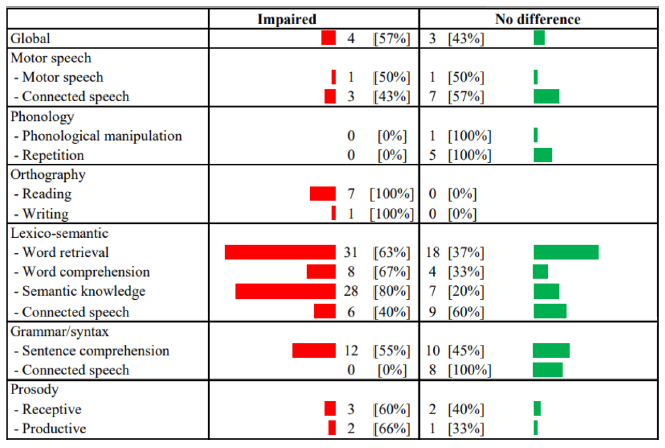Speech and language impairments in behavioral variant frontotemporal dementia: A systematic review
Geraudie, A., Battista, P., García, A. M., Allen, I. E., Miller, Z., Gorno-Tempini, M. L. & Montembeault, M. (2021). Speech and language impairments in behavioral variant frontotemporal dementia: A systematic review. Neuroscience and Biobehavioral Reviews 131, 1076-1095.
En esta revisión sistemática reseñamos 181 estudios sobre sobre alteraciones de habla y lenguaje en la variante conductual de la demencia frontotemporal. La literatura revela (a) déficits consistentes en habilidades léxico-semánticas, lectoescritura y prosodia; (b) alteraciones inconsistentes en aspectos motores y gramaticales; y (c) preservación relativa de capacidades fonológicas. La severidad de los déficits de habla y lenguaje se asociaría con el deterioro cognitivo global, atrofia temporal o frontotemporal y mutaciones en el gen MAPT. Estas anomalías pueden contribuir a la caracterización y fenotipificación de pacientes, con implicancias para el diagnóstico y abordaje integral de la enfermedad.
Para acceder al artículo, hacé click aquí.
Speech and language impairments in behavioral variant frontotemporal dementia: A systematic review
Geraudie, A., Battista, P., García, A. M., Allen, I. E., Miller, Z., Gorno-Tempini, M. L. & Montembeault, M. (2021). Speech and language impairments in behavioral variant frontotemporal dementia: A systematic review. Neuroscience and Biobehavioral Reviews 131, 1076-1095.
Although behavioral variant frontotemporal dementia (bvFTD) is classically defined by behavioral and socio-emotional changes, impairments often extend to other cognitive functions. These include early speech and language deficits related to the disease’s core neural disruptions. Yet, their scope and clinical relevance remains poorly understood. This systematic review characterizes such disturbances in bvFTD, considering clinically, neuroanatomically, genetically, and neuropathologically defined subgroups. We included 181 experimental studies, with at least 5 bvFTD patients diagnosed using accepted criteria, comparing speech and language outcomes between bvFTD patients and healthy controls or between bvFTD subgroups. Results reveal extensive and heterogeneous deficits across cohorts, with (a) consistent lexico-semantic, reading & writing, and prosodic impairments; (b) inconsistent deficits in motor speech and grammar; and (c) relative preservation of phonological skills. Also, preliminary findings suggest that the severity of speech and language deficits might be associated with global cognitive impairment, predominantly temporal or fronto-temporal atrophy and MAPT mutations (vs C9orf72). Although under-recognized, these impairments contribute to patient characterization and phenotyping, while potentially informing diagnosis and management.
To access the full paper, please click here.



